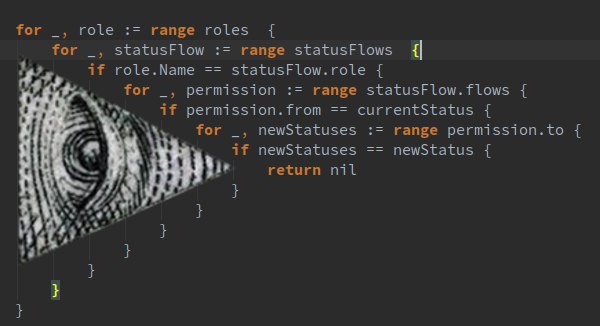Boas Práticas & Clean Code
com GolangBianca Rosa
lead dev @ stone pagamentos
- Python
- Go
- JS
- PythOnRio / Pyladies / Rails Girls RJ / WWG RJ
be a clean gopher


go fmt
Não tem nenhum motivo pra não usar a formatação padrão do Go.
Dica: tente automatizar.
Escolha bons nomes
There are only two hard things in Computer Science: cache invalidation and naming things.
Phil Karlton
func parse(s string) string {
return strings.Replace(s, " ", "", -1)
}func removeSpaces(s string) string {
return strings.Replace(s, " ", "", -1)
}func remove(s string, char string) string {
return strings.Replace(s, char, "", -1)
}Regra do Escoteiro
The Boy Scout Rule
func (p *Person) EhHoraDeDormir() bool {
hora := false
if p.sono == true && !p.ocupada == false {
hora = true
} else if time.Now().Hour() > 21 {
hora = true
}
return hora
}func (p *Person) HoraDeDormir() bool {
return p.sono == true && !p.ocupada == false || time.Now().Hour() > 21
}func (p *Person) DevoDormir() bool {
if p.sono && !p.ocupada {
return true
}
if time.Now().Hour() > 21 {
return true
}
return false
}func returnUsername(userId int) string {
if userId == 1 {
return "Maria"
} else if userId == 2 {
return "João"
} else if userId == 3 {
return "Joaquim"
} else if userId == 4 {
return "Ana Clara"
}
return "Não identificado"
}var users map[int]string
func init() {
users = map[int]string{
1: "Maria",
2: "João",
3: "Joaquim",
4: "Ana Clara",
}
}
func name(userID int) string {
name, ok := users[userID]
if ok == false {
return "Não identificado"
}
return name
}Comentários de código
// valida documentos
for _, document := range clientDocuments {
go request(rc, url, &document, ro)
}for _, doc := range documents {
go validate(channel, &doc)
}Princípio da Responsabilidade Única (SRP)
type fox struct{}
func (f *fox) Say() {
fmt.Println("Ring-ding-ding-ding-dingeringeding!")
}type fox struct{}
func (f *fox) Say() {
fmt.Println("Ring-ding-ding-ding-dingeringeding!")
}
func (f *fox) Meow() {
fmt.Println("Meow")
}type fox struct{}
func (f *fox) Say() {
fmt.Println("Ring-ding-ding-ding-dingeringeding!")
}
type cat struct{}
func (c *cat) Meow() {
fmt.Println("Meow")
}DRY
Don't Repeat Yourself
A menos que você esteja criando complexidade desnecessária
SEMPRE cheque seus erros
func converte(s string) int {
n, _ := strconv.Atoi(s)
return n
}func converte(s string) (int, error) {
n, err := strconv.Atoi(s)
return n, err
}func converte(s string) (int) {
n, err := strconv.Atoi(s)
if err != nil {
n = 0
//log error
}
return n
}O que não fazer


func hasPermission(roles []Role, statusFlows []StatusFlow, currentStatus, newStatus string) bool {
for _, role := range roles {
for _, statusFlow := range statusFlows {
if strings.ToLower(role.Name) == strings.ToLower(statusFlow.Role) {
if len(statusFlow.Flows) == 0 {
return true
}
for _, permission := range statusFlow.Flows {
if permission.From == currentStatus {
for _, newStatuses := range permission.To {
if newStatuses == newStatus {
return true
}
}
}
}
}
}
}
return false
}
Mas como resolver?

func (u *User) HasPermission(fromStatus, toStatus string) bool {
for _, role := range u.roles {
return role.hasPermission(fromStatus, toStatus)
}
return false
}func (r *Role) hasPermission(fromStatus, toStatus string) bool {
flows := Flows()
flow := matchedFlow(flows, r.Name)
if flow != nil {
return true
}
return flow.IsTransitionAllowed(fromStatus, toStatus)
}func matchedFlow(statusFlows []StatusFlow, name string) *StatusFlow {
for _, statusFlow := range statusFlows {
if strings.EqualFold(name, statusFlow.Role) {
return &statusFlow
}
}
return nil
}
func (f *StatusFlow) IsTransitionAllowed(from, to string) bool {
if len(f.Flows) == 0 {
return true
}
permission := f.PermissionForTransition(from)
for _, new := range permission.To {
if new == to {
return true
}
}
return false
}func (f *StatusFlow) PermissionForTransition(name string) *Permission {
for _, permission := range f.Flows {
if permission.From == name {
return &permission
}
}
return nil
}twitter: @__biancarosa
slides: biancarosa.com.br/slides/go-clean-code.html
code: github.com/biancarosa/beautiful-go
tks :)